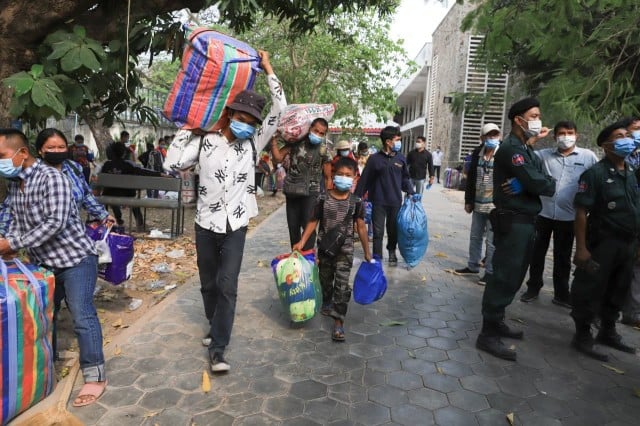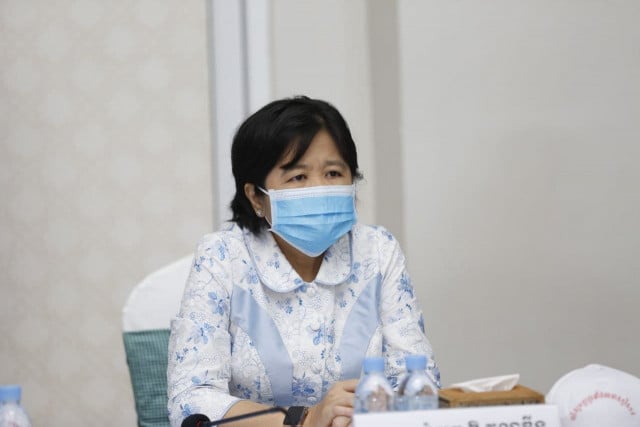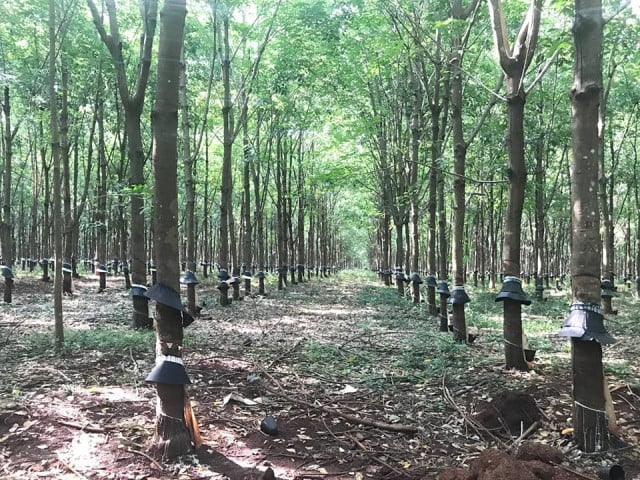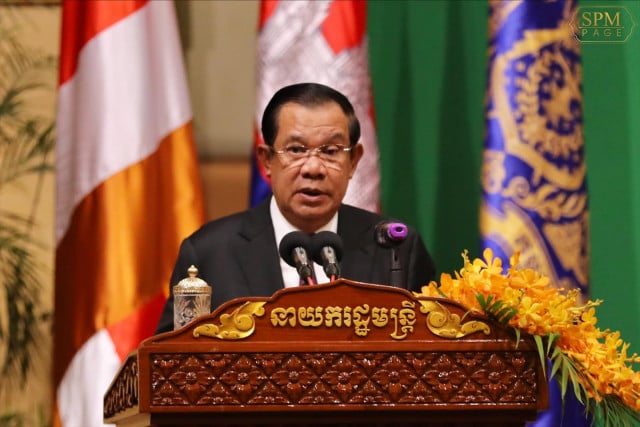Cambodian Migrant Workers Stuck in Thailand with COVID-19 as Border Closes

- By Gerald Flynn
- July 29, 2021 5:33 PM
The government’s decision to close the border traps as many as 1 million Cambodians in Thailand and could lead migrant workers with COVID-19 to smuggle themselves home as the Delta variant spreads
PHNOM PENH--Prime Minister Hun Sen announced late on July 28 that a raft of restrictions would be introduced to counter the growing number of COVID-19 cases, with a focus on Cambodian provinces that share a border with Thailand.
At roughly 11.45 p.m. on July 28, Hun Sen ordered the border between Thailand and Cambodia be temporarily closed to stem the flow returning migrant workers, many who have tested positive for COVID-19 on arrival.
In addition, eight provinces will enter a 14-day lockdown starting July 29 with red, orange and yellow zones set to be declared across Banteay Meanchey, Battambang, Koh Kong, Oddar Meanchey, Pailin, Preah Vihear, Pursat and Siem Reap provinces.
Similarly, a 9 p.m. to 3 a.m. curfew will fall upon Phnom Penh as of midnight July 30, but Hun Sen advised that provincial towns follow suit.
This comes as existing COVID-19 restrictions were “strengthened” by the prime minister’s directive, which also ordered a ban on dining in at restaurants, as well as the closure of “alcoholic beverage outlets,” cinemas, theaters, museums, sports clubs and fitness centers, although it is unclear whether these bans are to be implemented nationwide or just within Phnom Penh and the eight provinces now in lockdown.
The harsh new measures aim to contain the spread of the Delta variant, which has largely been linked to migrant workers returning from Thailand.
In July 2021, the Delta variant made up 63 percent of all new infections in Thailand and is believed to be responsible for the country’s worst COVID-19 outbreak to date. On July 28, Thailand saw a record 16,533 new cases—the largest number of new COVID-19 cases for a single day since Thailand’s first case—along with 133 deaths.
Cambodian health authorities reported that between July 22 and July 25, they had identified 39 cases of the Delta variant, most of which were linked to returning migrant workers, but eight cases involved people with no known exposure to migrant workers or health workers, prompting officials to label the eight cases as locally transmitted.
The closure of the Thai border leaves a number of Cambodian migrant workers stranded with no way home—only goods transportation vehicles will be allowed to pass across the border, although Hun Sen’s directive states that emergency situations may require people to cross into Cambodia.
Trapped in Thailand
“Considering the high numbers of Cambodians still working in Thailand illegally, it’s difficult to put an exact figure on how many are still there,” said Patrick Lee, a legal consultant with labor rights group CENTRAL. “Nevertheless, I don’t think it would be an exaggeration to say there’s at least a million Cambodian workers, if not more, in Thailand.”
CENTRAL has previously estimated that roughly 2 million Cambodians were working in Thailand prior to the pandemic, while the government has only acknowledged some 1 million migrant workers, but the waves of COVID-19 outbreaks and subsequent restrictions has seen ebbs and flows of Cambodians returning home during an outbreak, only to head back to Thailand—legally or otherwise—once the situation eased and jobs became available again.
This, in turn, has made it particularly challenging to keep accurate records of the true number of Cambodians working in Thailand throughout the pandemic.
Lee warned that the border closure will only make it harder to contain the spread of the Delta variant as more migrant workers will take to informal border crossing routes now that formal passages home have been closed.
“Realistically, they’re going to happen. They’re already happening daily. The Thai and Cambodian authorities catch some people, but they don’t catch everyone,” Lee added.
Earlier this month a group of 14 Cambodians attempted to smuggle themselves back to Cambodia, but were intercepted by the Thai authorities before they could reach the border, but throughout the pandemic there have been a number of incidents involving Cambodians desperately seeking a way home through any means available.
The threat posed by more potential Delta variant cases has met with tough new measures laid out by Banteay Meanchey Provincial Governor Sa Kaeo who announced a 14-day ban on migrant workers entering the province from July 29.
It is unclear what will happen to Cambodian migrant workers attempting to reach Banteay Meanchey Province, but General Department of Immigration Deputy Director-General Keo Vanthan said that the government has measures in place to deal with the spread of COVID-19 among returning migrants—he would not say what these measures consisted of.
According to Vanthan, the Ministry of Foreign Affairs met with their Thai counterparts on July 28 ahead of the border closure, just as they had done when the Cambodia-Vietnam border closed, to discuss the welfare of Cambodians who would be effectively trapped in Thailand.
Koy Kuong, spokesperson for the Ministry of Foreign Affairs, said “The Cambodian Embassy and Consulate General have regular contact with concerned authorities of Thailand regarding this matter.”
He did not detail what support the Cambodian Embassy in Thailand is providing to migrant workers, if any.
Undocumented and Unprotected
Loeung Sophon, who works at CENTRAL’s Thailand office, said that the situation has recently become much more serious for Cambodian migrants, adding that those who contract COVID-19 are not being treated and have nowhere to go, despite the Thai government’s promises.
“Most Cambodian workers who get infected with COVID-19 do not have an employer or someone to take them to the hospital, most of them are workers who have expired visas or their work permit letters are out of date, so they buy their own medicine and treat themselves wherever they are living,” Sophon said.
“By my observations, the Cambodian Embassy and consulate, I don't see any preparation of a treatment facility for workers yet,” he added. “They only published some measures on how to avoid catching COVID-19.”
The only Cambodians Sophon said he has seen able to access healthcare have been those with proper employers and valid documentation—he said he’d seen many more cases over the course of this month, adding that for every 1,000 migrant workers tested, roughly 500 have COVID-19.
According to the latest data from the Thai Ministry of Health, in mid-July 2021, there were some 9,000 Cambodian workers with COVID-19.
Vanthan of the Cambodian Immigration Department said that 55,154 Cambodian workers returned from Thailand from December 2020 to July 2021, including 6,328 workers who were returned to Cambodia by Thai authorities due to a lack of documentation. Of these 6,328 undocumented Cambodians, 260 were detained by Cambodian authorities upon their return.
“All relevant authorities along the border will continue to tighten border security to prevent and crack down on illegal cross-border travel,” said Vanthan.
This month alone, 7,814 workers returned from Thailand, he added, but noted that his department only recorded the number of Cambodians returning—the Labor Ministry was responsible for counting the number of Cambodians working abroad.
Heng Sour, spokesperson for the Ministry of Labor which is tasked with providing “necessary protection” for Cambodian workers in Thailand, could not be reached for comment at press time.
No Money and No Options
“And as we saw with the origins of the February 20 outbreak, it only takes one or two people to result in a massive outbreak. That’s even more of a risk now with migrant workers returning with the Delta variant,” said Lee.
Given the informal nature of the work that many Cambodians seek in Thailand, concerns are growing that less scrupulous employers in Thailand will do little to support their Cambodian staff, especially those who entered Thailand illegally or lack official documentation. Best estimates from CENTRAL suggest that very few Cambodians will be supported financially by their employer while there is no work to be done.
Compounding the matter is the fact that construction sites and factories, where a significant portion of Cambodians find themselves working in Thailand, have become epicenters for COVID-19 outbreaks, further heightening the risk that they will be exposed before attempting to find a way back home.
“Workers who want to return are doing so because they don’t have any work in Thailand,” said Lee. “Asking them to sit and wait for 14 days with no income isn’t realistic”
With jobs dwindling across Cambodia, opportunities for work in Thailand have and border restrictions have fluctuated in line with COVID-19 outbreaks, which has created serious disruption for Cambodian migrants unable to find work in their home country.
The National Bank of Cambodia reported a 17 percent drop in remittances in 2020, down from $1.5 billion in 2019 to $1.3 billion in 2020 as the pandemic culled opportunities overseas and sent hundreds of thousands of Cambodians back home as restrictions came into force.
“The vast majority [of workers] don’t have savings stockpiled that they can rely on while they wait and they’re getting little to nothing in the way of support from the Thai Government. And so if they can’t return legally, they’ll essentially be forced to return illegally where there’s a much lower chance that COVID positive workers will be detected,” said Lee.
“I would strongly urge the Cambodian Government to rethink this measure,” he added. “Forcing potentially COVID-positive workers into crossing the border illegally is a recipe for disaster.”
Additional reporting by Phoung Vantha















